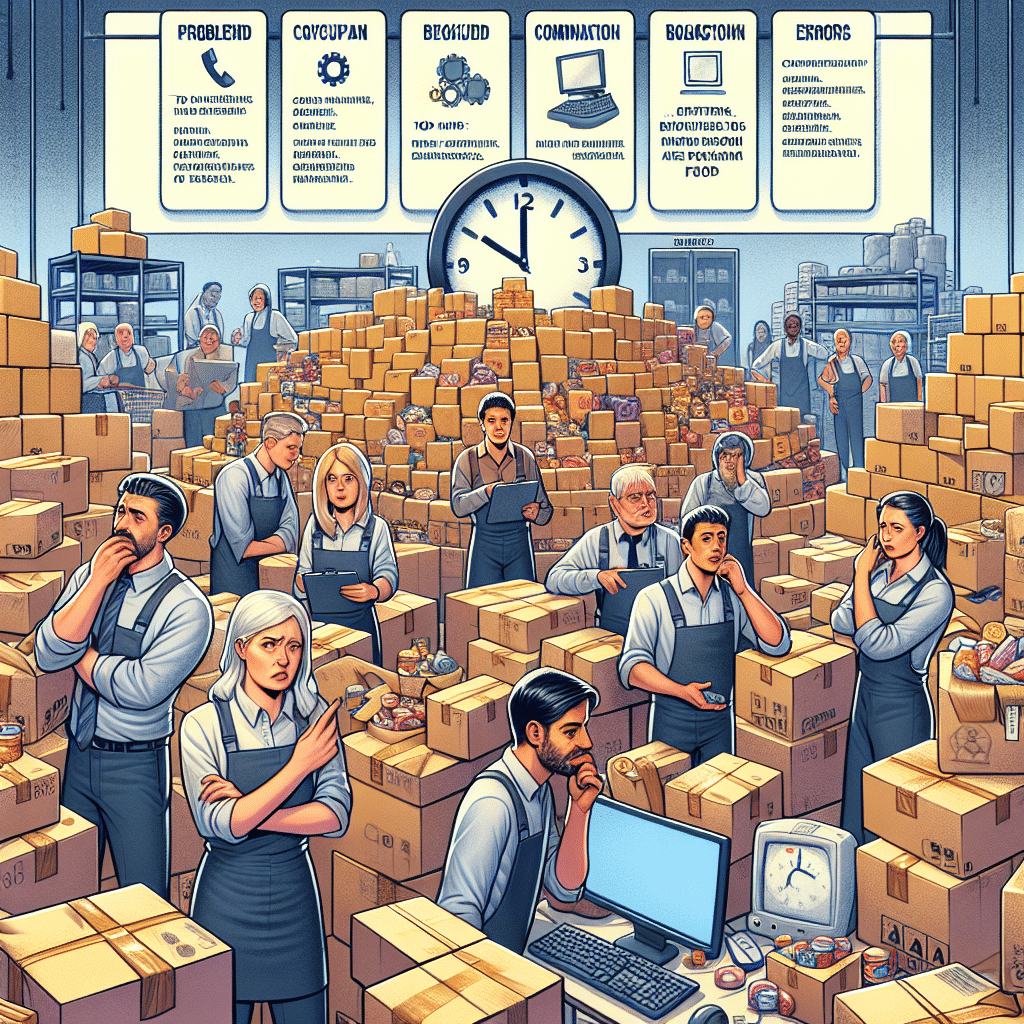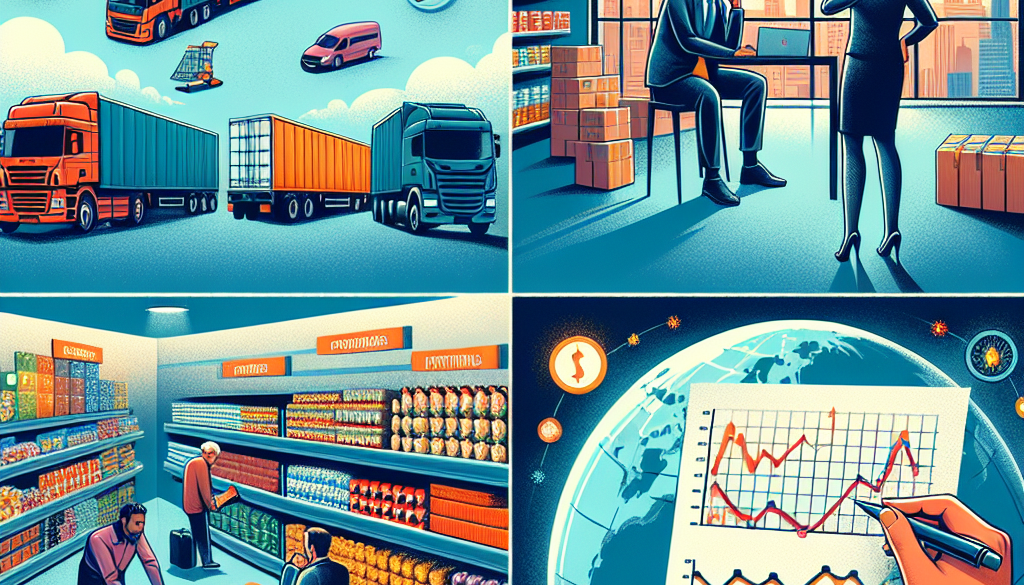Major Problems Facing the Food Distribution Sector
-
Table of Contents
- Challenges in Food Distribution: A Deep Dive into the Sector’s Struggles
- 1. Supply Chain Inefficiencies
- 2. Food Waste and Loss
- 3. Regulatory Compliance and Safety Concerns
- 4. Impact of Climate Change
- 5. Technological Disruption
- 6. Economic and Political Instability
- 7. Consumer Demand and Preferences
- Conclusion
- ETprotein’s Protein Products: A Solution for the Food Distribution Sector
Challenges in Food Distribution: A Deep Dive into the Sector’s Struggles

The food distribution sector is a critical component of the global economy, ensuring that food products move efficiently from producers to consumers. However, this sector faces a myriad of challenges that can disrupt the supply chain, affect food quality, and increase costs. In this article, we will explore the major problems confronting the food distribution industry and provide insights into the potential solutions.
1. Supply Chain Inefficiencies
One of the most significant issues in food distribution is the complexity and inefficiency of supply chains. Factors contributing to this include:
- Outdated technology and lack of integration between systems
- Complex logistics involving multiple intermediaries
- Regulatory hurdles that vary by region and country
- Insufficient infrastructure in rural or underdeveloped areas
These inefficiencies can lead to delays, increased waste, and higher costs for both businesses and consumers.
2. Food Waste and Loss
Food waste is a critical problem at various stages of the distribution process. According to the Food and Agriculture Organization (FAO), approximately one-third of all food produced for human consumption is lost or wasted globally. This issue is exacerbated by:
- Poor storage facilities and inadequate transportation
- Short shelf life of fresh produce
- Over-ordering and overproduction
- Lack of coordination between different players in the supply chain
Reducing food waste is not only an ethical imperative but also a means to improve profitability and sustainability in the food distribution sector.
3. Regulatory Compliance and Safety Concerns
Ensuring food safety and compliance with regulations is a constant challenge for food distributors. The sector must navigate:
- A complex web of local, national, and international food safety standards
- The need for rigorous quality control and traceability systems
- Consumer concerns about contamination, allergens, and additives
Non-compliance can lead to recalls, legal penalties, and a loss of consumer trust.
4. Impact of Climate Change
Climate change poses a significant threat to food distribution networks. Extreme weather events can disrupt production and logistics, while changing climate patterns can affect crop yields and availability. The sector must adapt to these changes by:
- Investing in more resilient infrastructure
- Diversifying supply sources
- Implementing sustainable practices to mitigate environmental impact
Adaptation strategies are essential to ensure the long-term viability of food distribution networks.
5. Technological Disruption
While technology offers solutions to many problems in the food distribution sector, it also presents challenges. The rapid pace of technological change requires companies to:
- Continuously invest in new systems and training
- Stay ahead of the curve in adopting innovations like blockchain and IoT
- Protect against cybersecurity threats
Those who fail to keep up with technological advancements risk falling behind competitors.
6. Economic and Political Instability
Global economic and political instability can have a profound impact on food distribution. Issues such as trade wars, tariffs, and sanctions can:
- Disrupt global supply chains
- Lead to fluctuations in commodity prices
- Force companies to alter sourcing and distribution strategies
Navigating these uncertainties requires agility and strategic planning.
7. Consumer Demand and Preferences
Changing consumer preferences and demand for greater transparency and sustainability are reshaping the food distribution sector. Companies must:
- Adapt to trends like organic and plant-based diets
- Provide clear labeling and product information
- Source products ethically and sustainably
Meeting these consumer demands is crucial for maintaining market share and brand reputation.
Conclusion
The food distribution sector is grappling with a range of complex challenges that require innovative solutions and strategic thinking. From supply chain inefficiencies and food waste to regulatory compliance and the impact of climate change, these issues demand attention and action. Technological advancements offer promising solutions, but they also bring new challenges that must be managed. As consumer preferences evolve, the sector must adapt to remain competitive and ensure the safe, efficient, and sustainable distribution of food products worldwide.
In light of these challenges, companies like ETprotein are stepping up to offer sustainable and high-quality protein products that meet the evolving needs of consumers and the food distribution sector. ETprotein’s commitment to non-GMO, allergen-free, and high-purity protein products positions them as a valuable partner for businesses looking to navigate the complexities of food distribution while adhering to consumer demands for transparency and sustainability.
ETprotein’s Protein Products: A Solution for the Food Distribution Sector
ETprotein’s range of organic bulk vegan proteins and L-(+)-Ergothioneine (EGT) products offer a solution to some of the challenges faced by the food distribution sector. Their high-quality, neutral-tasting proteins can help companies address consumer demand for sustainable and ethical food choices. With a focus on non-GMO and allergen-free attributes, ETprotein’s products are suitable for a wide range of industries, including nutraceuticals, pharmaceuticals, and food and beverage.
For businesses in the food distribution sector looking to improve their product offerings and adapt to market changes, ETprotein provides a reliable source of premium proteins. Their expertise in exporting and delivering tailor-made protein powder and nutritional supplements ensures that clients receive comprehensive solutions to meet their protein needs.
About ETprotein:
ETprotein, a reputable protein and L-(+)-Ergothioneine (EGT) Chinese factory manufacturer and supplier, is renowned for producing, stocking, exporting, and delivering the highest quality organic bulk vegan proteins and L-(+)-Ergothioneine. They include Organic rice protein, clear rice protein, pea protein, clear pea protein, watermelon seed protein, pumpkin seed protein, sunflower seed protein, mung bean protein, peanut protein, and L-(+)-Ergothioneine EGT Pharmaceutical grade, L-(+)-Ergothioneine EGT food grade, L-(+)-Ergothioneine EGT cosmetic grade, L-(+)-Ergothioneine EGT reference grade and L-(+)-Ergothioneine EGT standard. Their offerings, characterized by a neutral taste, non-GMO, allergen-free attributes, with L-(+)-Ergothioneine purity over 98%, 99%, cater to a diverse range of industries. They serve nutraceutical, pharmaceutical, cosmeceutical, veterinary, as well as food and beverage finished product distributors, traders, and manufacturers across Europe, USA, Canada, Australia, Thailand, Japan, Korea, Brazil, and Chile, among others.
ETprotein specialization includes exporting and delivering tailor-made protein powder and finished nutritional supplements. Their extensive product range covers sectors like Food and Beverage, Sports Nutrition, Weight Management, Dietary Supplements, Health and Wellness Products, and Infant Formula, ensuring comprehensive solutions to meet all your protein needs.
As a trusted company by leading global food and beverage brands and Fortune 500 companies, ETprotein reinforces China’s reputation in the global arena. For more information or to sample their products, please contact them and email sales(at)ETprotein.com today.












